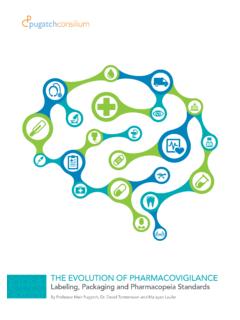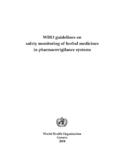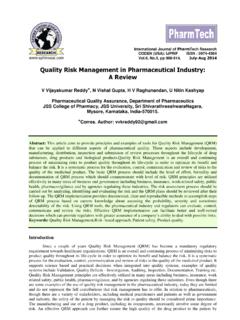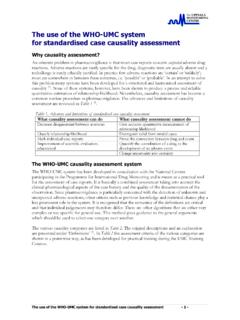Transcription of What does oversight and delegation mean for the …
1 *Corresponding author email: GroupSymbiosis does oversight and delegation mean for the Qualified Person Responsible for pharmacovigilance ?Brian Edwards1*, W N Richardson21 Principal Consultant, NDA Regulatory Science Ltd2 Medical Adviser, NDA Regulatory Science LtdInternational Journal of PharmacovigilanceOpen AccessOpinion articleto streamline decision-making. Ideally, safety and pharmacovigi-lance should be the QPPV s sole occupation, not an extra task in addition to other functions. The skills required and the roles and responsibilities for the QPPV are so numerous and varied that he/she must delegate many tasks to deputies, managers and oth-er staff working within the organization. The QPPV, however, re-tains accountability in that he/she must maintain oversight over all delegated tasks and the entire pharmacovigilance system.
2 what should a QPPV expect from the MAH?Compliance with regulatory guidance for the QPPV depends on unhindered cooperation with the MAH s organization, which in turn should visibly promote safety to underpin the QPPV role. The MAH must openly acknowledge the importance of this role for organizational success and ensure the views of the QPPV are listened to and be seen to be taken into account. This may be accomplished by: Making the position one of high rank in the organization so the QPPV has the authority to act and remove barriers to change. Having regular meetings between the QPPV and the chief executive officer and/or the board of the company with regular presentations to the company s senior management. Ensuring that the QPPV function has the resources and organizational support necessary to implement and maintain a compliant pharmacovigilance system Backing the QPPV when the going gets tough by demonstrating trust and confidence.
3 Training the QPPV to develop the necessary skills in leadership and delegation . Providing educational opportunities to the QPPV so he or she can continually seek best practices to improve the efficiency of operation of the pharmacovigilance system. Ensuring the QPPV receives regular briefings about AbstractThe EU/EEA Qualified Person Responsible for pharmacovigilance (QPPV) is personally accountable for the pharmacovigilance quality system of a Marketing Authorization Holder (MAH) in the European Union/European Economic Area (EU/EEA). This has resulted in a long list of tasks, implementation of which requires oversight and delegation . Regardless of how these responsibilities appear in the legislation, what they mean in reality has neither been defined nor have they been agreed within the pharmaceutical sector.
4 Based on our own experience and good business practice, we present a personal view on how a QPPV should implement oversight and approach delegation , which can be applied in practice. Training to fulfill these responsibilities is required as part of the toolkit for the QPPV, and the management of the MAH is obliged by the legislation to provide all necessary support to enable the QPPV to discharge his/her : Qualified person for pharmacovigilance ; Deputy; oversight ; DelegationReceived: December 11, 2016; Accepted: December 16, 2016; Published: December 26, 2016*Corresponding author: Brian Edwards, Principal Consultant, pharmacovigilance & Drug Safety, NDA Regulatory Science Ltd, Grove House, Guildford Road, Leatherhead, Surrey, KT22 9DF UK, Tel: +44 (0)1372 860631; Mob: +44(0)7894 586771; Fax: +44 (0)1372 860611.
5 Email: the sceneThe EU/EEA qualified person responsible for pharmaco-vigilance is the most important defined natural person in the EU pharmaceutical legislation. The extensive role and responsibili-ties are described in GVP Module I Section [1]. However, in spite of the exhaustive GVP guidance very little has been writ-ten about, and there is no published consensus on, how this role should be effectively implemented [2,3]. Indeed, with no agreed competency framework, it is debatable exactly what it means to be qualified . Thus, based on our own experience of providing multiple QPPV services in big and small companies over the last 15 years, we would like to share our opinions about how some aspects of this role might be implemented optimally to maximize the benefit to both Marketing Authorization Holder (MAH) and patients as well as to the interrelationships that must be estab-lished within the wider company.
6 Not only is the QPPV a legal and regulatory requirement for the MAH but, we believe, faced with the complexity of the GVP modules, the QPPV role is neces-sary to enable systems-based thinking to improve efficiency and Page 2 of 4 Citation: Edwards B, Richardson WN (2016) what does oversight and delegation mean for the Qualified Person Responsible for pharmacovigilance ?. Int J Pharmacovigil 1(2): 4. what does oversight and delegation mean for the Qualified Person Responsible for pharmacovigilance ?Copyright: 2016 de Edwards and Richardson benefit-risk information, and quality and performance metrics concerning the pharmacovigilance system, as agreed with the return, the attributes required by the MAH of a QPPV might include: Being held in high regard by peers regardless of rank as a wise counsel someone who walks the walk and not just talks the talk.
7 This applies both internally within an organization and externally while networking. Possessing knowledge and skills required for effective oversight of a pharmacovigilance system with insight into training needs, corporate culture, root cause analysis, designing corrective actions and organizational learning. A QPPV does not need to be a medical graduate but, if not, must have ready access to a medical opinion. Indeed, the key skills go way beyond medical and regulatory knowledge typically associated with pharmacovigilance to include skills around communication, organizational ability and team-working [4]. Understanding what is required to identify and to correct deficiencies in the system to acceptable standards. Accessibility and the ability to put members of the organization at ease so they feel they readily turn to the QPPV for a reasonable and pragmatic opinion or advice without fear of impulsive blame or unjustified adverse criticism.
8 Being an individual who promotes action, rather than reaction, such as by setting up of training programs, audit and gap-analyses, and supporting the implementation of improved methodologies. Being able to explain requirements regarding relevant safety information for benefit-risk assessment and current stakeholder expectations in of oversightGVP Module 1 states that the QPPV has oversight over the functioning of the system in all relevant aspects, including its quality However, the term oversight is open to interpretation as there is no definition in legislation or guidance as to what oversight means. The meaning is reflected in both the definitions arising from two dictionaries as follows: Merriam-Webster: watchful and responsible care and Oxford English Dictionary: The action of overseeing something.
9 It may help to understand in practical terms what oversight means, if we turn to other areas where oversight is applied such as in government and public services. In these sectors, oversight implies scrutiny of processes and holding to account. From this we have concluded that there are three possible components of oversight for the QPPV that need to be discussed in the context of the pharmacovigilance system: monitoring of processes, critically appraising policy and practice and advising on for change management skills and leadershipStandards for systems-based thinking and behavior are not well-established in the pharmaceutical industry [4]. Within a pharmaceutical company, the responsibilities of the QPPV impact multiple processes, departments, and professionals who may perceive things differently and may have different motivations and incentives.
10 To be a successful QPPV requires an understanding of systems, behavior change, and culture while identifying the needs of the various stakeholders. This requires leadership skills, which differ from but overlap with those of management. The QPPV may be required to act as a manager in one area where he/she may have line management responsibility, whereas outside this area, the QPPV may need different skills to achieve desired aims for the benefit of the art of delegation is essential for the QPPV functionGVP Module 1 states that The QPPV may delegate specific tasks, under supervision, to appropriately qualified and trained individuals, for example, acting as safety experts for certain products, provided that the QPPV maintains system oversight and overview of the safety profiles of all products.






